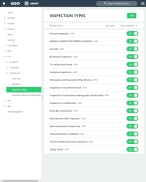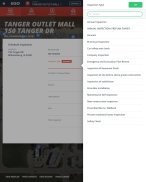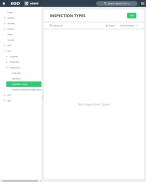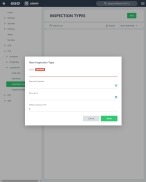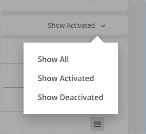Define inspection types for the Inspections module
An inspection is an organized examination or formal evaluation of a property, building, or occupant. The results are compared to specified requirements and standards (codes) for determining whether the inspected entity complies with these requirements and standards.
An inspection type is a collection of one or more related checklists that an inspector uses when performing an inspection. In the Properties module, you must select an inspection type when you schedule an inspection, to indicate what type of inspection will be performed.
In the Admin module, you can build the list of inspection types that appear as options when you are scheduling an inspection in the Properties module, and you click the Inspection Type field.
-
Do one of the following.
-
(If you are already working in the ESO Suite) Click the Home icon in the upper left corner of the screen.
-
 (If you have not yet logged in) Log in to the ESO Suite.
(If you have not yet logged in) Log in to the ESO Suite.
-
In a web browser, go to https://www.esosuite.net/EsoSuite.
The ESO Suite login screen appears.
-
Enter your user name, password, and agency name, then click Let's Go.
If MFA is enabled, the Multi-factor authentication dialog box appears, displaying one or more methods you can use to verify your login credentials. The number of methods that appear in the dialog box depends on what MFA methods your ESO Suite administrators enabled in the Admin module.

Click graphics
to open them.Information on enabling MFA and specific MFA methods is available in the Admin module online help, in Configure multiple-factor authentication.
Note: If your ESO Suite administrators have disabled MFA ("opted-out"), this dialog does not appear.
-
(If the Multi-factor authentication dialog box appears) Depending on which buttons appear in the dialog box, verify your login in one of the following ways.
 With an authenticator application.
With an authenticator application.
-
Click MFA verification via authenticator app.
The dialog box updates with boxes for entering the numbers of the authentication code, and the ESO Suite sends an authentication code to the authenticator application installed on your device.
-
Open your authenticator application and note the authentication code currently displayed.
-
Enter the authentication code displayed in the authenticator application.
-
Click Log In.
 With a text message (SMS).
With a text message (SMS).
-
Click MFA verification via SMS.
The dialog box updates with boxes for entering the numbers of the authentication code, and the ESO Suite sends an authentication code to the phone number recorded in your PM records and identified with MFA codes.
-
Enter the authentication code sent to your MFA-registered phone number.
-
Click Log In.
 With an email message.
With an email message.
-
Click MFA verification via email.
The dialog box updates with boxes for entering the numbers of the authentication code, and the ESO Suite sends an authentication code to your agency or department email address, recorded in your PM records.
-
Enter the authentication code sent to your agency or department email address.
-
Click Log In.
-
-
The ESO Suite landing screen appears.

Click graphics
to open them.Note: You can access and manage your MFA options through the PM module, on the Settings > Account page, as described in Manage a user account. If your agency or department has enabled MFA but has not purchased the full-featured version of the PM module, you can access your own MFA settings by clicking Change my Multi-Factor Authentication settings on the landing screen, then using the Settings > Account page that appears. If your agency has not enabled MFA, the Change my Multi-Factor Authentication settings link does not appear on the landing screen.
-
-
On the top side of the home screen, click Admin.
Tip: If your screen or browser window is too narrow to display all your agency's ESO Suite module icons, an options icon appears on the right side of the icon bar. If you click the options icon, a menu appears containing additional module icons.
The Admin screen appears, displaying the Welcome screen.
-
In the left pane, expand Fire > Inspections, then click Inspection Types.
The Inspection Types screen appears.
-
Do any of the following.
 Add an inspection type.
Add an inspection type.
-
In the upper right corner, click Add.
The New Inspection Types dialog box appears.
Note: You must fill in all fields indicated as
REQUIREDon this screen. - In Name, type the name of the inspection type you are adding to the list.
- For Required Checklists, click the list icon to the right of the field, select all the appropriate options from the menu that appears, then click OK or click outside the menu.
- For Recurrence, click the field or the list icon to the right of the field, then select the appropriate single option from the menu that appears, then click OK or click outside the menu.
- In Default Inspection Fee, type the amount of money the agency or department charges to perform this type of inspection.
-
Click Done.
Note: It may take a few moments for a new list item in the Admin module to propagate to the corresponding field in the Properties module.
 Edit an inspection type.
Edit an inspection type.
-
For the list item you want to edit, click Edit to the right of the item name.
Note: If Edit does not appear beside the item name, on the right side of the list, drag the slider button to the right, until On appears. The item must be activated before you can edit it.
The Edit dialog box appears, displaying the values already specified for that list item.
- Change the information in the fields as needed.
- Click Done.
 Search for an inspection type.
Search for an inspection type.
-
In the Search field, type the characters in the name of the list item you need to find.
As you add each character, the list automatically reduces to only items containing that sequence of characters.
 Video: Search a list
Video: Search a list
Note: The process for searching a list shown below applies to any list in the ESO Suite.
 Filter the inspection types.
Filter the inspection types.
-
On the right side of the screen, click the filter menu.
Note: The name of the menu varies, reflecting the option currently selected for filtering the list. Show All appears as the default selected option.
The menu of filter options appears.
-
Select the option you want to use to filter the list.
The list updates to reflect your selection.
 Video: Filter a list
Video: Filter a list
Note: The process for filtering a list shown below applies to any list in the ESO Suite.
 Activate or deactivate an inspection type.
Activate or deactivate an inspection type.
Note: To give you time to finish building an inspection type before it is available as a selection when scheduling inspections in the Properties module, an inspection type is not automatically activated when you create it in the Admin module. After you activate the inspection type, you can select it when scheduling inspections.
You can also deactivate an inspection type if you no longer want it to appear as an option when scheduling inspections in the Properties module.
-
For the inspection type you want to activate, on the right side of the list, drag the slider button to the right, until On appears.
 Video: Activate and deactivate a list item
Video: Activate and deactivate a list item
Note: The process for activating and deactivating a list item shown below applies to any list in the ESO Suite.
 Export the inspection type list to a .csv file.
Export the inspection type list to a .csv file.
-
In the upper right corner of the list, click Export.
The Admin module generates a
.csvfile containing all the items in the list, whether they are activated or deactivated, and regardless of how you are filtering the list. The.csvfile downloads to your default download location.
-

